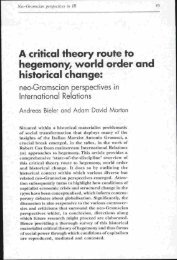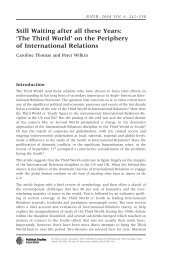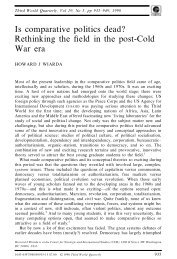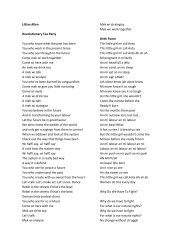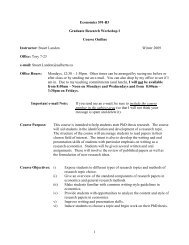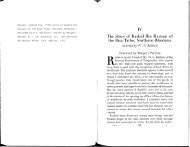personal memories revolutionary states and indian ocean migrations
personal memories revolutionary states and indian ocean migrations
personal memories revolutionary states and indian ocean migrations
Create successful ePaper yourself
Turn your PDF publications into a flip-book with our unique Google optimized e-Paper software.
ambitious title as “Tocqueville in the<br />
Ottoman Empire”, might have tackled<br />
these questions, as well as the possible<br />
impact of Tocqueville on Ottoman<br />
intellectuals or <strong>states</strong>men of the second<br />
half of the 19th century.<br />
Ariel Salzmann’s book is set to<br />
become an important contribution to<br />
the present revival in Ottoman studies.<br />
In openly advocating the use of a<br />
concept – the old regime – elaborated in<br />
a different cultural sphere, Salzmann<br />
contributes to breaking the traditional<br />
parameters of Ottoman studies <strong>and</strong> to<br />
broadening the horizons of post-cultural<br />
_______________________________<br />
Fikret Adanır <strong>and</strong> Suraiya Faroqhi<br />
(editors)<br />
The Ottomans <strong>and</strong> the Balkans: A<br />
Discussion of Historiography<br />
Leiden: Brill Press, 2002<br />
Reviewed by Ryan Gingeras ∗<br />
Despite the brief wave of<br />
interest that marked the 1990s, the<br />
Balkans has largely faded from public<br />
discourse. The gradual disappearance of<br />
Southeastern Europe from the pages of<br />
the morning newspaper has had a<br />
profound affect upon the visibility of<br />
the region within both popular <strong>and</strong><br />
academic publishing. The once<br />
numerous works related to the fall of<br />
Yugoslavia <strong>and</strong> nationalism seen on the<br />
shelves of bookstores across North<br />
America <strong>and</strong> Europe appear now to<br />
have been replaced by studies of the<br />
Middle East <strong>and</strong> Islam. The book under<br />
review, The Ottomans <strong>and</strong> the Balkans: A<br />
Discussion of Historiography, was published<br />
as this turn began to take effect. Largely<br />
comprised of a series of papers<br />
submitted at the Congress of German<br />
Historians in 1993, The Ottomans <strong>and</strong> the<br />
Balkans is a thorough <strong>and</strong> up-to-date<br />
critique of the historiography of the<br />
∗ Ryan Gingeras is a Ph.D. c<strong>and</strong>idate in History<br />
at the University of Toronto.<br />
94<br />
studies. In addition, her interpretations<br />
of the peculiarities of the Ottoman<br />
regime are particularly convincing. And<br />
if questions do remain, for example<br />
about the passage towards modernity or<br />
about different local conditions, they are<br />
mostly invitations to persevere in the<br />
promotion of conceptual comparativism<br />
between various cultural spheres, which<br />
moves beyond a mere transfer, <strong>and</strong> of<br />
an Ottoman comparativism, based upon<br />
a critical intimacy with archives.<br />
_______________________________<br />
region, representing a strong rebuttal to<br />
the nationalist <strong>and</strong> statist frameworks<br />
that define the historical writings in the<br />
region over the last two centuries. At<br />
the core of each of the essays presented<br />
in this work is a shared rejection of the<br />
claim that the “Ottoman yoke” stunted<br />
the growth <strong>and</strong> development of the<br />
region <strong>and</strong> denied to its people their<br />
true identity. Further than<br />
demonstrating the inherent tensions <strong>and</strong><br />
contradictions within the dominant,<br />
state-centred narratives of the region,<br />
each author suggests new<br />
methodological approaches in dealing<br />
with the Ottoman Balkans.<br />
The writing of history <strong>and</strong> its<br />
relationship to state-building is a theme<br />
that reoccurs throughout this volume.<br />
As a tool for justifying or legitimizing<br />
state policy, historical inquiry into the<br />
Ottoman past continues to provide a<br />
sounding board for the evolution the<br />
empire’s successor <strong>states</strong>. The various<br />
interpretations of Ottoman history cited<br />
in this book trace several processes by<br />
which state agendas necessitate the<br />
development of national histories. In<br />
surveying how the legacies of the early<br />
Ottoman state were understood by<br />
historians of the mid-nineteenth <strong>and</strong><br />
early twentieth centuries, Christoph<br />
Neumann <strong>and</strong> Büşra Ersanlı respectively<br />
point to a shared belief that the early<br />
Ottoman state’s socio-economic failures<br />
Vol. 5, Fall 2005, © 2005 The MIT Electronic Journal of Middle East Studies




